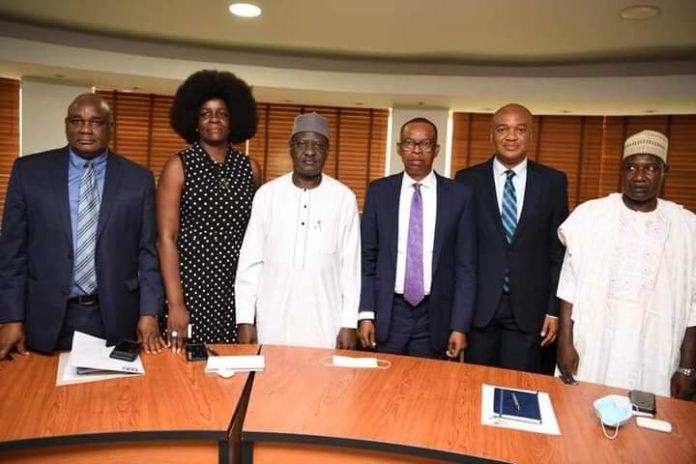The Nigerian Communications Commission (NCC) and the Nigeria Economic Summit Group (NESG) are considering possible areas of increasing collaboration to enhance the impact and contribution of telecommunications sector on Nigeria’s socio-economic development.
This was the crux of deliberations during a courtesy visit by a delegation of the National Assembly Business Environment Round Table (NASSBER), a policy unit at NESG led by Nnanna Ude and a member of the technical committee of NASSBER, Yemi Keri.
The need for stakeholder collaboration and engagement between the Commission and other stakeholders in order to conduct an impact assessment and gap analysis of the Nigerian Communications Act (NCA) 2003, which will lead to improvement of the legal instrument and reflect new trends, especially in a post-pandemic world, was the primary focus of the visit.
The two entities also considered synergy in the area of Research and Development (R&D); while NESG has expressed its desire to have the Commission feature prominently in the forthcoming Nigeria Economic Summit (NES), an annual summit organised by the NESG, scheduled to hold in October this year.
While receiving the delegation on behalf the Executive Vice Chairman of NCC, Prof. Umar Garba Danbatta, the Director, Public Affairs, NCC, Dr. Ikechukwu Adinde, stated that the meeting was a welcome development, as it aligns with the telecom regulator’s strategic partnership and collaboration objectives.
Adinde stated that the NCA 2003 is a robust regulatory instrument, which has given the NCC the mandate to regulate the telecom sector effectively, as seen in the contribution to the overall economic development of the country.
He stated further that, by virtue of Section 70 of the NCA 2003, the Commission has developed various regulations and issued guidelines that have helped in addressing critical issues pertaining to its regulatory activities.
Other senior management staff of the Commission, including the Director, Licensing & Authorisation, Muhammed Babajika; Director, Technical Standards & Network Integrity, Bako Wakil and representatives of the departments of Legal & Regulatory Services; Policy Competition & Economic Analysis; and Financial Services of the Commission, took turns to talk about the activities of the Commission in implementing its regulatory mandate for the benefit of the country.
Mr Babajika spoke on the licensing regime of the Commission and its impact on innovation in the economy, while Engr Wakil spoke about NCC’s regulatory efforts and collaborations with various stakeholders, such as the Nigeria Governors’ Forum (NGF) towards addressing challenges to quality of service (QoS) in telecom industry.
The impact of these challenges such as multiple taxation and regulations, fibre cuts, vandalism, high cost of Right of Way (RoW), theft of telecoms facilities and the need for the passage of the Critical National Infrastructure (CNI) Bill into law.
Speaking earlier on behalf of the Chief Executive Officer of NESG, Laoye Jaiyeola; Ude acknowledged the critical role NCC is playing in the provision of essential digital support for the Nigerian economy. He noted that, in 20 years of telecoms liberalisation, the Commission has been contributing significantly to the country’s Gross Domestic Product (GDP).
Ude explained that the visit was part of the efforts of the NESG to strengthen collaboration with key institutions of government such as the NCC. He extolled the role of the Commission in driving telecommunications sector growth through efficient and result-oriented regulations, noting that the impact of the regulations are evident in industry performance indicators which have shown upward trajectory over the recent years.
“The NCC is key to the digital transformation agenda of the government and we can see the footprints of the readiness of the country on that journey, in terms of the level of broadband penetration, internet subscription, teledensity and other critical indicators,” he said.
Meanwhile, Adinde, stated that the Commission was excited by the prospects of partnering with NESG and NASSBER, noting that such partnership will further enhance telecoms contribution to Nigeria’s socio-economic growth. He added that “all the issues discussed will be articulated in a memorandum, which will be submitted to Management for consideration.”




